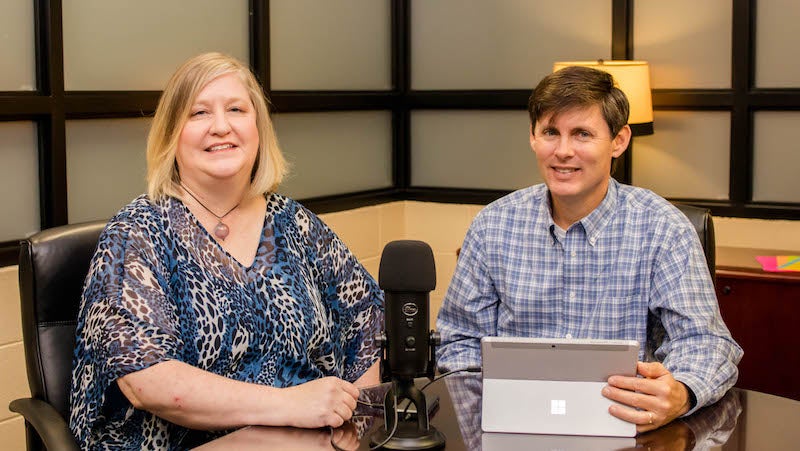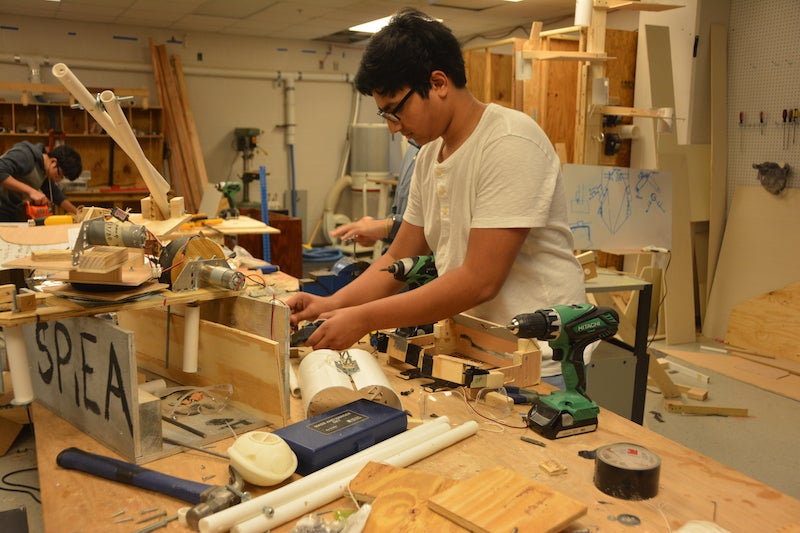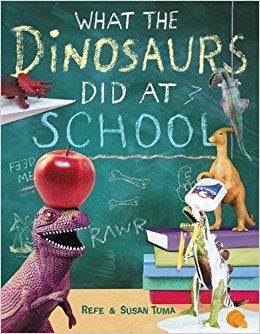By Madoline Markham
Photos by Morgan Hunt
There’s a lot that can be said about parenting, but two Hoover City Schools mental health professionals highlight the idea of roots and wings. In the words of Jonas Salk, “Good parents give their children roots and wings—roots to know where home is, wings to fly away and exercise what’s been taught them.” And that’s just what they talk on their podcast by that very name, with monthly conversations focusing on topics like social media, substance abuse and gratitude.
To learn more about the podcast and what the school systems offers regarding mental health and wellness, we talked with podcast hosts Kandace VanWanderham, mental health and student services specialist at Hoover City Schools, and Brian Rodgers, an intervention counselor at Crossroads School, Hoover City Schools’ alternative school.
How did the podcast came to be?
Brian: We had a parent email newsletter that went out about mental health, and I joked that we could do a podcast because it’s easier to get together and talk about these topics. You get thousands of emails, and this instead is a very accessible way to listen to a topic that might be of interest to you. We also have so many people in the district, including six social workers, who have a mental health focus, so it was a great way to connect them and have them around the table. For each episode we discuss the issue at hand and give one or two takeaways.
Kandace: We have a lot of faculty and staff who listen to it. There are topics that apply to everyone community-wide.
Where do the name Roots and Wings come from?
Brian: As we raise kids up from an early age, there is a saying that as parents we want to develop kids with deep roots that give a foundation in our beliefs and in themselves and the wings to fly away when the time comes. It captures what we want to do as parents and educators, to have that solid rooting in a wellness and wellbeing, so when students get to 12th grade no matter what path life takes them on, they are equipped to soar.
What topics have you covered?
Brian: Our first one was on gratitude around Thanksgiving, and then we went into grief in the holidays followed by alcohol awareness and substance abuse and then heathy relationships in February and finally having boundaries in social media.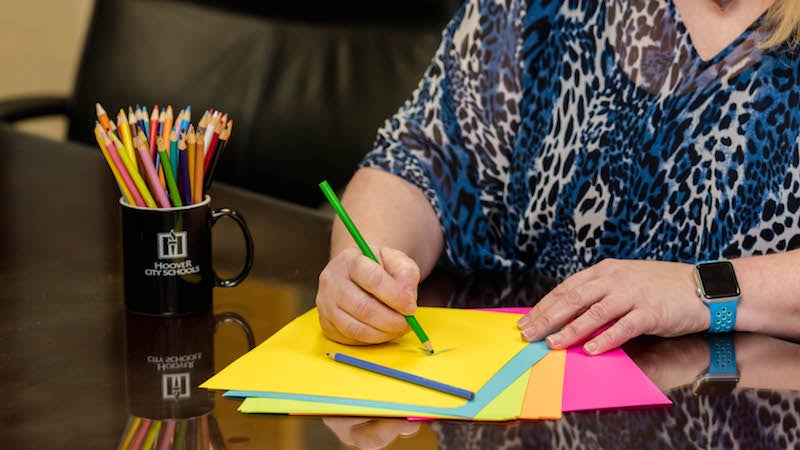
Which episodes stand out the most to you?
Brian: The one on substance abuse was less scripted, and we had more dialogue. It’s eye-opening how substance abuse affects adolescents early and how the pandemic has affected it. We have seen a rise in all of those issues.
Kandace: Social media was the one I was least familiar with. Sometimes we hear the negative side of social media, but sometimes there are some positive aspects to social connections that are virtual.
Brian: Our first one was on cultivating the attitude of gratitude in kids. Mental health doesn’t always have to be on the negative side. It can be a positive, enhancing thing too. When we cultivate gratitude in ourselves and our kids, it offsets the scales a little bit for all the heaviness we live with.
How does the podcast fit into what else y’all are doing with mental health for the school system?
Brian: As far as our mental health approach for the district goes, the students are our primary focus, but the parents need tools to raise these resilient and creative kids too. We also want to reach the faculty. It’s a threefold approach that works together.
Kandace: We do parent seminars; we did one this week on stress and anxiety and the impact of the pandemic in partnership with psychologists from Children’s of Alabama. You can find out about the next ones on Hoover City Schools social media and on school e-news.
Brian: We have also re-implemented a family strengthening program with Impact Family Counseling. It’s a six-session parent and child psycho education program where they learn communication skills, boundaries, negotiation in the family, and how to deal with anger issues. It’s free and led by counselors. At the high school level we are doing it in-house as an eight-session program called Bridges that focuses on similar topics with parents and children. They practice some of the things they learn.
Kandace: We want to do new and innovative things every year. We partnered with the city for Be Kind week pink shirt day, and we partner with the mayor and chamber of commerce.
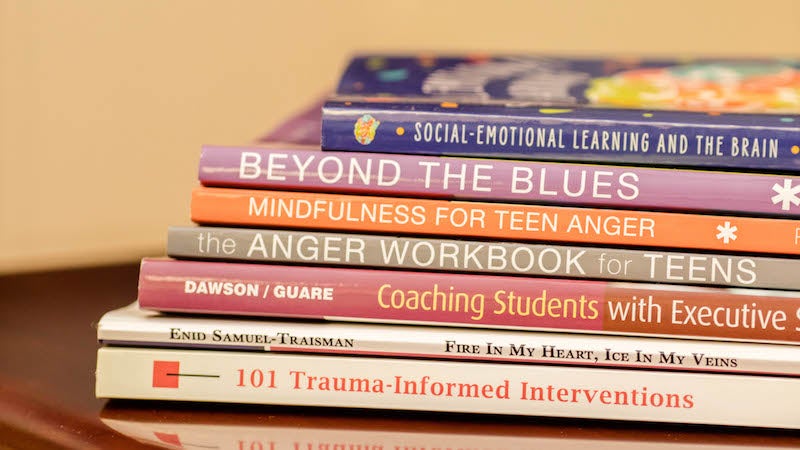 Why do you think it’s important for mental health programs to be a part of a school system?
Why do you think it’s important for mental health programs to be a part of a school system?
Kandace: Students can’t learn if they aren’t well, including their mental health.
Brian: I used to work at Amelia Center, and we had a program at the alternative school for Jefferson County and were able to identity kids dealing with grief. When we put a social worker and counselor that worked with them, the behavior programs almost disappeared because they had a compassionate adult giving them attention and helping them identify coping skills and seeing another path. Recidivism went from 86 percent to 12 percent, which reinforced that belief that mental health matters. Some of the things kids go through nowadays are things we never had to face, but they are also struggling for independence and feel like they can deal with things themselves. That’s not a healthy place to be at any time in life.
What strengths to see in the generation that are students now?
Brian: They are very adaptive and resilient.
Kandace: They have faced something that most of us have never had to face in our lifetime, being at home for a year, and now we having them back to school making those connections again. That’s strength that will become more apparent as these kids get older.
What do you get asked about the most?
Kandace: Our biggest seminar last year on human trafficking and how to protect your child from predators. Vaping is always a big issue, and stress and anxiety has been the biggest issue for the past five years. There are some great tips on breathing and a worry box you can use for stress and anxiety. Finding a scheduled time to disconnect is a good strategy too. Here in Hoover Veterans Park has been on the increase, and as we take care of ourselves physically, it helps us mentally. Sometimes carving out that time is hard to do, but it’s important to know not only will you be healthier but your child will be as well.
Is there anything else you’d want parents and community members to know about the resources the school system offers regarding mental health and wellness?
Brian: Your school counselor is a resource for your child. So many times we forget when we are going through stuff that they are there. Sometimes a parent might not think to tell the counselor if there is a death of a loved one, but they have often have preexisting grief groups and can work through different activities. If they need outside resources, the counselor knows who to refer you to as well.
Kandace: A lot of things we offer for the school system regarding mental health and wellness are open to the whole community. If we are all communicating the same message, it makes a bigger impact.
Listen In
Roots & Wings makes a great listen on your drive to and from work, school or activities. Search for “Roots & Wings” on Apple Podcasts, Spotify or wherever you listen to podcasts to queue it up.

